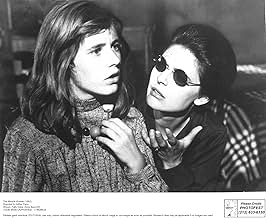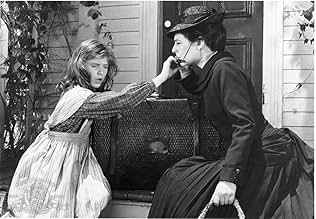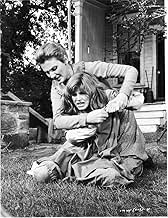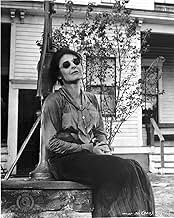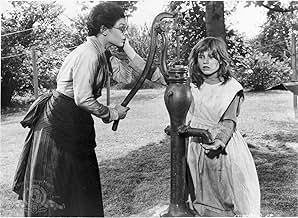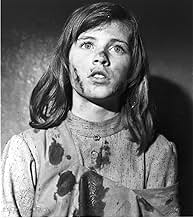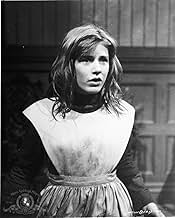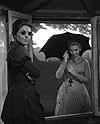ÉVALUATION IMDb
8,1/10
22 k
MA NOTE
L'histoire du combat d'Anne Sullivan pour enseigner à Helen Keller, aveugle et muette, à communiquer.L'histoire du combat d'Anne Sullivan pour enseigner à Helen Keller, aveugle et muette, à communiquer.L'histoire du combat d'Anne Sullivan pour enseigner à Helen Keller, aveugle et muette, à communiquer.
- A remporté 2 oscars
- 13 victoires et 13 nominations au total
Maribel Ayuso
- Undetermined Role
- (uncredited)
Dale Ellen Bethea
- Martha at Age 10
- (uncredited)
John Bliss
- Admissions Officer
- (uncredited)
Grant Code
- Doctor
- (uncredited)
Michael Darden
- Percy at Age 10
- (uncredited)
Michele Farr
- Annie at Age 10
- (uncredited)
William F. Haddock
- 2nd Crone
- (uncredited)
Alan Howard
- Jimmie at Age 8
- (uncredited)
Judith Lowry
- 1st Crone
- (uncredited)
Helen Ludlam
- 3rd Crone
- (uncredited)
Beah Richards
- Viney - Keller Maid
- (uncredited)
Avis en vedette
Powerfully directed by Arthur Penn and supported by two Oscar-winning performances, The Miracle Worker dramatizes the early years of Helen Keller, the blind and deaf mute who became a famous author and prominent Socialist. Anne Bancroft's first lead role is as Anne Sullivan, Helen's lifelong teacher and friend and her performance is compelling. Patty Duke is also outstanding as Helen, portraying the disturbed child as she works to overcome bad manners and temper tantrums, the result of being overly indulged by her well meaning but ineffective parents. Moving into a small cottage away from her parents, Anne, who was partially blind herself, assists Helen with some tough love and begins to teach her to spell with her fingers.
Until this point, Helen had no understanding of the meaning of words. This changed when Anne led her to the water pump and spelled out the word water as she pumped the water over Helen's hand. She is said to have learned thirty words the same day and eventually learned to read. In 1904 Helen graduated from Radcliffe College, becoming the first deaf-blind person to earn a Bachelor of Arts degree. The film could have easily descended into melodrama, but Penn keeps his focus and the result is enormously moving without being maudlin. The Miracle Worker is a miracle.
Until this point, Helen had no understanding of the meaning of words. This changed when Anne led her to the water pump and spelled out the word water as she pumped the water over Helen's hand. She is said to have learned thirty words the same day and eventually learned to read. In 1904 Helen graduated from Radcliffe College, becoming the first deaf-blind person to earn a Bachelor of Arts degree. The film could have easily descended into melodrama, but Penn keeps his focus and the result is enormously moving without being maudlin. The Miracle Worker is a miracle.
Where do I begin? Shall I speak of Mrs Bancroft's performance,one of the finest you can watch on a screen?Shall I tell about Patty Duke's tour de force?Shall I praise the mind-boggling work of Arthur Penn,directing the long fight around the table?This movie is a miracle in itself.Behind her dark spectacles,the teacher hides buried terrors,that's why she's bound to understand her unusual pupil.She knows that the solution to her problems lies in herself,that the family is a prison .The parents do not see(or do not want to see) that they erect a wall between their daughter and the world outside by poisoning her with protection.That's why Annie seems brutal,hard on Helen.She could not have broken the wall if she had been a "nice" teacher.Among all Penn's great movies ,"miracle worker" is the only one that has an optimistic end.Since,other directors have tackled autism(children of a lesser God,rain man)but no one has surpassed this black and white gem.
With two terrific leading performances, an absorbing and thought-provoking story, and many well-conceived touches by Arthur Penn and his production team, this classic version of "The Miracle Worker" is an exceptional movie that appeals to the imagination and that has much to say about humanity. The story itself is so good that even the lesser remakes have been worth seeing, but there is really no reason at all to look any further than this nearly flawless filming of the story.
As Annie Sullivan and Helen Keller, Anne Bancroft and Patty Duke could not have been better. The battle of wills and wits between the two is engrossing, becoming quite involved and very interesting. The lengthy dining room struggle alone would make any movie worth watching - it is worthwhile even beyond the interesting action itself, as it brings out aspects of human nature and human learning that go beyond even Helen's own trials.
There is a great deal of substance to the movie that goes beyond the immediate issues and confrontations, and a significant reason for the greatness of the film is the way that Bancroft and Duke tap into the imagination of the viewer. The concept of seeing an unseen world (and the challenge of helping someone to see it) is brought out in ways that are profound yet accessible.
The two leads carry almost the whole picture, as the other characters are there primarily for Annie and Helen to play off of. Accordingly, the supporting cast keep their characters more simple, and their performances stylized and almost exaggerated, which allows Bancroft and Duke to have most of the moments of significance. The production also enhances the picture through simple but well-conceived settings, use of lighting, and other features that nicely complement the main action.
It's always rather unfortunate that movies like this one, which take a little effort to appreciate fully, are not given more attention. If you stop to consider what Helen Keller had to face in life, it is a situation far more terrifying than facing any of the cartoonish, artificial movie villains that gain so much notoriety. And if you consider the job that Annie Sullivan had to do, her accomplishment is far more impressive and worthwhile than almost any scientific discovery, feat of athletics, or military exploit.
That this movie is able to convey such themes makes it a memorable classic that is much more worthwhile than many movies that have received far more acclaim.
As Annie Sullivan and Helen Keller, Anne Bancroft and Patty Duke could not have been better. The battle of wills and wits between the two is engrossing, becoming quite involved and very interesting. The lengthy dining room struggle alone would make any movie worth watching - it is worthwhile even beyond the interesting action itself, as it brings out aspects of human nature and human learning that go beyond even Helen's own trials.
There is a great deal of substance to the movie that goes beyond the immediate issues and confrontations, and a significant reason for the greatness of the film is the way that Bancroft and Duke tap into the imagination of the viewer. The concept of seeing an unseen world (and the challenge of helping someone to see it) is brought out in ways that are profound yet accessible.
The two leads carry almost the whole picture, as the other characters are there primarily for Annie and Helen to play off of. Accordingly, the supporting cast keep their characters more simple, and their performances stylized and almost exaggerated, which allows Bancroft and Duke to have most of the moments of significance. The production also enhances the picture through simple but well-conceived settings, use of lighting, and other features that nicely complement the main action.
It's always rather unfortunate that movies like this one, which take a little effort to appreciate fully, are not given more attention. If you stop to consider what Helen Keller had to face in life, it is a situation far more terrifying than facing any of the cartoonish, artificial movie villains that gain so much notoriety. And if you consider the job that Annie Sullivan had to do, her accomplishment is far more impressive and worthwhile than almost any scientific discovery, feat of athletics, or military exploit.
That this movie is able to convey such themes makes it a memorable classic that is much more worthwhile than many movies that have received far more acclaim.
I'm not certain if it was fate but it is very interesting that I had the chance to finally see "The Miracle Worker" a few days after the sad news of the death of Anne Bancroft.
The film, based on the play by William Gibson, is an extremely well-acted film, brilliantly opened up on the big screen. Anne Bancroft as teacher Annie Sullivan and Patty Duke as young Helen Keller are outstanding. Sullivan's determination to communicate to the deaf and blind Helen made for a compelling story on stage as well as on screen.
I understand that when Hollywood wanted to make this movie, the powers-that-be did not want Bancroft or Duke. After finally seeing the movie, I'm glad that director Arthur Penn and producer Fred Coe chose to make this movie outside the so-called Hollywood establishment.
One scene that was discussed in some other posts was the dining room in which Sullivan forces Helen to eat food from a spoon and not her hands. It almost felt like I was watching a fierce wrestling match. It was a physical, as well as an emotionally draining, sequence. A battle of wills between teacher and the unwilling student. It was brilliantly edited and directed.
The film was not without faults. According to the IMDb, a number of flashback scenes were filmed in their entirety but did not work out very well. Those scenes were incorporated within the movie and it looked rather clumsy. The scenes could have been easily edited out completely.
As with all plays adapted to the big screen, some scenes were a little bit stagy. But that involved just a few scenes and, overall, it did not ruin the movie.
What I really liked about the movie was that the filmmakers were very successful at not succumbing to sentiment. This movie could have easily been very corny and sappy. Perhaps Bancroft and Duke and their performances had something to do with that.
I've been a fan of Anne Bancroft for many years and I'm very glad that I had the chance to see her well-deserved Oscar-winning performance.
RIP Ms. Bancroft.
The film, based on the play by William Gibson, is an extremely well-acted film, brilliantly opened up on the big screen. Anne Bancroft as teacher Annie Sullivan and Patty Duke as young Helen Keller are outstanding. Sullivan's determination to communicate to the deaf and blind Helen made for a compelling story on stage as well as on screen.
I understand that when Hollywood wanted to make this movie, the powers-that-be did not want Bancroft or Duke. After finally seeing the movie, I'm glad that director Arthur Penn and producer Fred Coe chose to make this movie outside the so-called Hollywood establishment.
One scene that was discussed in some other posts was the dining room in which Sullivan forces Helen to eat food from a spoon and not her hands. It almost felt like I was watching a fierce wrestling match. It was a physical, as well as an emotionally draining, sequence. A battle of wills between teacher and the unwilling student. It was brilliantly edited and directed.
The film was not without faults. According to the IMDb, a number of flashback scenes were filmed in their entirety but did not work out very well. Those scenes were incorporated within the movie and it looked rather clumsy. The scenes could have been easily edited out completely.
As with all plays adapted to the big screen, some scenes were a little bit stagy. But that involved just a few scenes and, overall, it did not ruin the movie.
What I really liked about the movie was that the filmmakers were very successful at not succumbing to sentiment. This movie could have easily been very corny and sappy. Perhaps Bancroft and Duke and their performances had something to do with that.
I've been a fan of Anne Bancroft for many years and I'm very glad that I had the chance to see her well-deserved Oscar-winning performance.
RIP Ms. Bancroft.
This movie made a strong impression on me when I saw it on Tv as a lad and I have revisted it a few more times but it had been a decade since i saw it last and my daughter had a done a book report on Helen Keller recently and was very moved by her story and I mentioned the Miracle Worker, so we rented it and viewed it tonight and it still packs a wallop and the performances are first rate. Patty Duke won the best supporting oscar that year and deserved it (even though she beat out Mary Badham who played Scout in To Kill A Mockingbird -- what a year for young actresses!!!)and Anne Bancroft is amazing as the tough, determined Anne Sullivan. A wonderful film.
Le saviez-vous
- AnecdotesMark Twain was the first person to refer to Anne Sullivan as "the miracle worker". Twain was a friend of Helen Keller.
- GaffesAnnie Sullivan has to look up the word discipline in a dictionary later in the film even though she's used it in a letter near the beginning; however, she remarks that she must know how to spell it before teaching it to Helen, and may have simply used her best guess in the letter since nothing was at stake.
- Citations
Annie Sullivan: Pity? For this tyrant? The whole house turns on her whims! Is there anything she wants she doesn't get? I'll tell you what I pity: that the sun won't rise and set for her all her life, and every day you're telling her it will! What good will your pity do when you're under the strawberries, Captain Keller?
- ConnexionsEdited into Histoire(s) du cinéma: Le contrôle de l'univers (1999)
- Bandes originalesHush, Little Baby
(uncredited)
Traditional Southern lullaby
Music adapted by Don Costa
Lyrics by Arthur Siegel
Sung by Anne Bancroft
Also played in the score
Meilleurs choix
Connectez-vous pour évaluer et surveiller les recommandations personnalisées
- How long is The Miracle Worker?Propulsé par Alexa
- What is 'The Miracle Worker' about?
- Is 'The Miracle Worker' based on a book?
- What happened to Annie Sullivan's brother Jimmie?
Détails
Box-office
- Budget
- 500 000 $ US (estimation)
- Brut – à l'échelle mondiale
- 4 139 $ US
- Durée1 heure 46 minutes
- Couleur
- Mixage
- Rapport de forme
- 1.85 : 1
Contribuer à cette page
Suggérer une modification ou ajouter du contenu manquant




